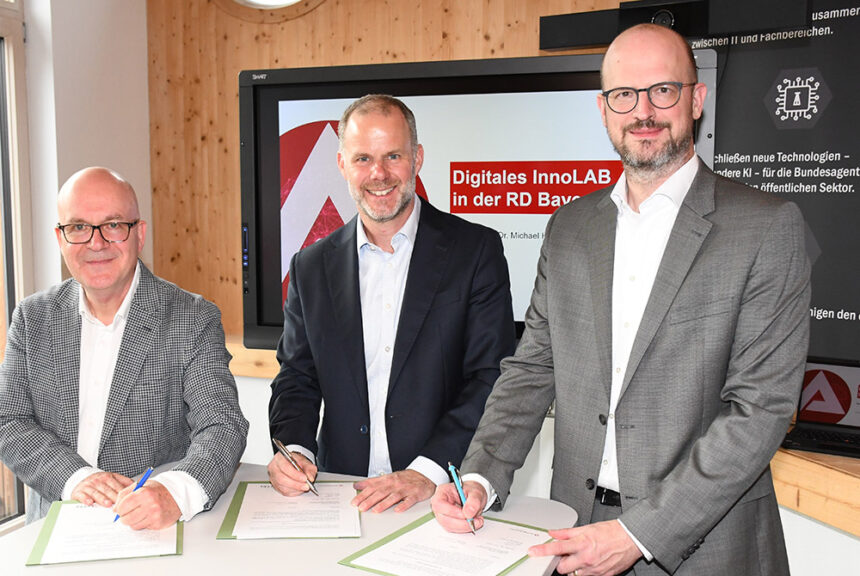The Bavarian Regional Directorate of Bundesagentur für Arbeit (Federal Employment Agency) and the University of Technology Nuremberg want to learn from and with each other in the field of AI in order to make even more targeted use of digital technologies in the public sector. This was recorded in the form of a joint Memorandum of Understanding.
The need for digital transformation does not stop at public administration. UTN Founding President Prof. Dr. Michael Huth visited the Bavarian Regional Directorate of Bundesagentur für Arbeit to discuss the future of artificial intelligence and its potential applications in everyday working life with its Chairman Dr. Markus Schmitz.
The Regional Directorate’s digital innovation lab has set itself the task of testing new technologies that make work processes more efficient and reduce the workload on employees.
A Memorandum of Understanding was therefore signed with Prof. Dr. Huth, who is regarded as a leading scientist in the field. This paves the way for close cooperation between the Technical University of Nuremberg and the Innovation Lab. The aim is to combine research and practice to find out how artificial intelligence can sustainably shape the future of the public sector.
“We are delighted to have signed the cooperation agreement with the UTN. Our aim is to open up employees to new technologies and develop specific use cases for the use of AI in the public sector. For example, a digital assistant will be created that can support colleagues in completing tasks,” says Schmitz. “I am very much looking forward to embarking on an innovation journey together with Bundesagentur für Arbeit in Bavaria to see how we can open up the world of modern technologies for public administration,” said Prof. Huth.
One possible field of application is the area of education and training. “Here, we could use an AI-supported learning buddy to support all trainees and students with a digital mentor on their learning journey,” says Markus Schmitz.


The Bavarian Regional Directorate of Bundesagentur für Arbeit (Federal Employment Agency) and the University of Technology Nuremberg want to learn from and with each other in the field of AI in order to make even more targeted use of digital technologies in the public sector. This was recorded in the form of a joint Memorandum of Understanding.
The need for digital transformation does not stop at public administration. UTN Founding President Prof. Dr. Michael Huth visited the Bavarian Regional Directorate of Bundesagentur für Arbeit to discuss the future of artificial intelligence and its potential applications in everyday working life with its Chairman Dr. Markus Schmitz.
The Regional Directorate’s digital innovation lab has set itself the task of testing new technologies that make work processes more efficient and reduce the workload on employees.
A Memorandum of Understanding was therefore signed with Prof. Dr. Huth, who is regarded as a leading scientist in the field. This paves the way for close cooperation between the Technical University of Nuremberg and the Innovation Lab. The aim is to combine research and practice to find out how artificial intelligence can sustainably shape the future of the public sector.
“We are delighted to have signed the cooperation agreement with the UTN. Our aim is to open up employees to new technologies and develop specific use cases for the use of AI in the public sector. For example, a digital assistant will be created that can support colleagues in completing tasks,” says Schmitz. “I am very much looking forward to embarking on an innovation journey together with Bundesagentur für Arbeit in Bavaria to see how we can open up the world of modern technologies for public administration,” said Prof. Huth.
One possible field of application is the area of education and training. “Here, we could use an AI-supported learning buddy to support all trainees and students with a digital mentor on their learning journey,” says Markus Schmitz.